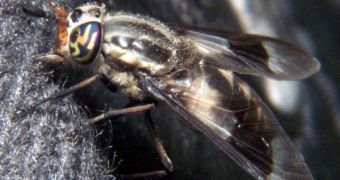As it turns out it really pays to be stupid. Well, at least for flies it does. A study carried out by a team of researchers from a Swiss university revealed that dumber flies live much longer than their geeky cousins. According to the results of the study revealed today by Tadeusz Kwackei and Joep Burger at the University of Lausanne, there is a definite correlation between the mental capabilities of a fly and its life longevity.
The researchers say that in their study they used flies from the Basel region of the northwestern areas of Switzerland, which have been divided into two groups. The control group was left in its natural environment, while the other one received an intelligence boost by learning how to associate smell and taste either with a certain type of food or with experiences it had encountered.
After 30 to 40 generations of flies, they showed clear improvements in their learning capabilities and were able to retain memories over longer periods of time. Simply put, they became smarter. At the end of the test, the control group seemed to live longer than its counterpart, having a lifespan between 80 and 85 days as opposed to the smarter flies which only reached a lifespan between 50 and 60 days on average.
"In other terms, the more the fly becomes intelligent, the shorter its lifespan", said the team of researchers.
Why this is happening is not quite known, albeit the researchers speculated that the most likely cause is the increase in neural activity of the flies, which triggers an imbalance in the life-support system, leading to a much shorter lifespan than they would have had if they had been left in their natural state.
"This would explain why flies, like most other animals, have hardly developed their neural capacities", the researchers said.

 14 DAY TRIAL //
14 DAY TRIAL //